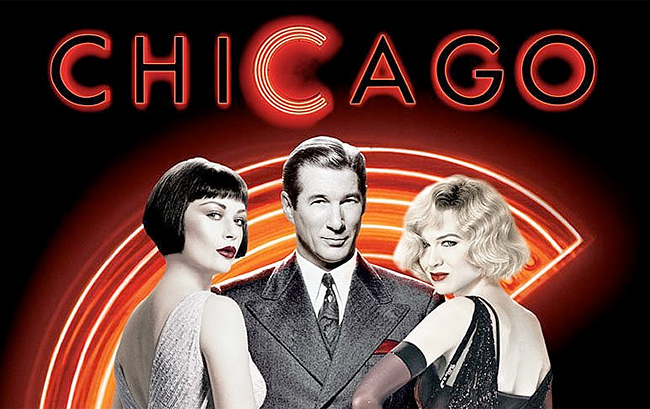“Chicago,” directed by Rob Marshall and released in 2002, is a dazzling musical film adaptation of the Broadway musical of the same name. Set in 1920s Chicago, the film combines elements of jazz, dance, and drama to tell a story of fame, corruption, and the pursuit of the American Dream. With a star-studded cast including Renée Zellweger, Catherine Zeta-Jones, and Richard Gere, “Chicago” captivated audiences with its stylish choreography, memorable musical numbers, and provocative narrative.
Plot Summary
“Chicago” follows the story of Roxie Hart (Renée Zellweger), a young aspiring performer who dreams of stardom on the vaudeville stage. When Roxie shoots her lover in a fit of rage, she finds herself in the Cook County Jail awaiting trial for murder. In prison, Roxie meets Velma Kelly (Catherine Zeta-Jones), a famous vaudeville performer also charged with murder. Both women vie for the spotlight and the attention of their slick lawyer, Billy Flynn (Richard Gere), who manipulates the media and courtroom to their advantage.
As Roxie’s trial becomes a media sensation, she and Velma compete not only for fame but also for the sympathy of the public and the outcome of their legal battles. The film explores themes of celebrity culture, corruption in the justice system, and the lengths people will go to achieve their ambitions in the Roaring Twenties.
Themes
“Chicago” delves into themes of fame, manipulation, justice, and the allure of celebrity in America’s Jazz Age. The characters navigate a world where perception often outweighs truth, and the pursuit of fame can lead to moral compromise and personal redemption. The film challenges perceptions of innocence and guilt, blurring the lines between reality and theatricality as characters use the media and public opinion to their advantage.
Visuals and Cinematic Style
Rob Marshall’s direction in “Chicago” brings the vibrant world of 1920s Chicago to life with dynamic choreography, elaborate set designs, and dazzling costumes. The film seamlessly integrates musical numbers into its narrative, blending fantasy and reality to create a visually stunning and immersive experience for audiences. Marshall’s background in musical theater shines through in his innovative staging and his ability to capture the energy and rhythm of the era’s jazz music.
Cast and Characters
Renée Zellweger delivers a standout performance as Roxie Hart, capturing the character’s ambition, vulnerability, and determination to achieve fame at any cost. Catherine Zeta-Jones shines as Velma Kelly, portraying the vaudeville star with confidence and charisma. Richard Gere brings charm and wit to the role of Billy Flynn, the smooth-talking lawyer who orchestrates Roxie’s legal defense and media circus.
The supporting cast includes John C. Reilly as Roxie’s naive and devoted husband Amos Hart, Queen Latifah as Matron Mama Morton, the prison warden with connections to Chicago’s underworld, and Christine Baranski as Mary Sunshine, a sensationalist journalist covering Roxie’s case.
Awards and Recognition
“Chicago” received widespread acclaim upon its release and went on to win six Academy Awards, including Best Picture, Best Supporting Actress (Catherine Zeta-Jones), and Best Art Direction. The film’s success at the Oscars and other awards ceremonies solidified its place as a modern classic in the musical genre. The soundtrack, featuring iconic songs like “All That Jazz” and “Cell Block Tango,” became a chart-topping hit and further contributed to the film’s cultural impact.
Legacy
As a cinematic adaptation of the long-running Broadway musical, “Chicago” revitalized interest in the musical genre and demonstrated the enduring appeal of theatrical storytelling on the silver screen. Rob Marshall’s innovative direction and the cast’s stellar performances brought new life to the characters and themes originally conceived by Bob Fosse and Fred Ebb.
“Chicago” continues to be celebrated for its stylish production values, memorable musical sequences, and timeless themes that resonate with audiences of all generations. The film’s exploration of fame, justice, and the price of ambition remains relevant in today’s entertainment landscape, reaffirming its status as a beloved classic in American cinema.
Conclusion
In conclusion, “Chicago” directed by Rob Marshall is a triumph of visual style, musicality, and storytelling that captures the essence of the Jazz Age while exploring timeless themes of fame, corruption, and the pursuit of dreams. Through its dynamic performances, dazzling choreography, and evocative cinematography, the film transports audiences to a world where appearances often deceive and where the quest for fame can lead to unexpected consequences. “Chicago” stands as a testament to the power of musical theater and its ability to entertain, provoke thought, and leave a lasting impression on audiences around the world.
